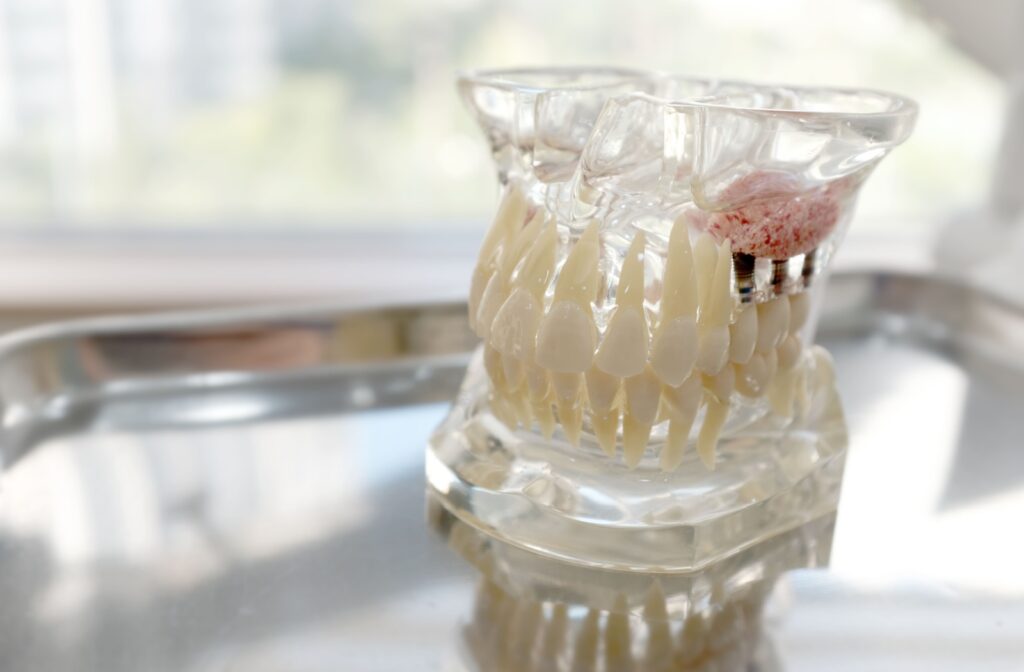If you’re considering dental implants to replace missing teeth, one of your biggest questions might be: Will they feel like real teeth?
Dental implants are designed to feel, look, and function just like natural teeth. Once they’ve healed and your custom crown is in place, most patients say they forget the implant is even there.
Whether you’re eating, smiling, or speaking, implants can provide a seamless, stable experience that closely mimics the real thing.
Understanding what makes implants feel so natural and how the process works can help prepare you for your dental treatment.
What Makes a Dental Implant Feel Real?
Dental implants have 3 main components: the implant post, abutment, and crown. Each plays a role in helping the tooth feel and function like it belongs.
Surgically Anchored Like a Natural Tooth
The implant post is placed directly into the jawbone, acting as a replacement tooth root. Over time, it fuses with the bone in a process called osseointegration.
The artificial root creates a solid, stable foundation like a natural tooth root.
Customized Crowns That Match Your Smile
The visible portion of the implant, known as the crown, is custom-crafted to match your surrounding teeth in size, shape, and shade. From casual conversations to wide smiles, no one will know it’s not your original tooth, including you.
No Slipping or Movement
Unlike removable dentures, implants stay in place. There’s no clicking, shifting, or awkward slipping during meals or conversations. They feel fixed and natural because they are.
How Dental Implants Compare to Other Options
When weighing your options, it’s helpful to consider how implants compare to dentures and bridges in terms of comfort and realism.
Implants vs. Dentures
Dentures rest on top of the gums and can sometimes feel bulky or loose. They also cover more of the mouth, potentially affecting taste and speech. Implants, by contrast, don’t rely on suction or adhesives and don’t cover the roof of your mouth.
Implants vs. Bridges
Dental bridges require support from neighboring teeth, which can compromise their structure over time. Implants are stable on their own and can help preserve the integrity of surrounding teeth while offering a more natural feel.
What to Expect During the Healing Process
Getting a dental implant is a multi-step process, and feeling fully comfortable with your new tooth takes time. Here’s a breakdown of what happens along the way.
Placement of the Implant Post
The first step is when your dentist surgically inserts the post (the artificial root) into the jawbone under local anesthesia.
There are 2 main ways this can happen: either your dentist can place the post and the abutment together in one appointment, or the abutment placement requires a follow-up appointment.
Some mild swelling or discomfort is normal for a few days, but most patients manage well with over-the-counter pain relief.
Healing & Bone Integration
Over the next 2–6 months, the implant fuses with the bone as new growth occurs around the implant. During this time, you may have a temporary crown, and you’ll gradually adjust to the feeling of the post in your mouth.
Attaching the Crown
Once healing is complete, your dentist will attach your permanent crown to the abutment to secure it. Now that your replacement tooth is complete, you can start to feel like your implant is a natural, fully functioning part of your smile.
Daily Life with a Dental Implant
After your implant is placed and healed, it should feel no different than any other tooth. Caring for your implant is just as simple as caring for your natural teeth. You won’t need any special tools for brushing or flossing, which is different from traditional dentures or dental bridges.
Here’s how a dental implant fits into your everyday routine.
Chewing
Dental implants can restore chewing power. There are no food restrictions once your implant is fully healed. That means you can enjoy apples, steak, and crunchy veggies again.
Speaking
Implants are anchored and stable, supporting clear, natural speech. Depending on how many implants are needed and the person, there may be a brief adjustment period where speech feels slightly different. As the mouth adapts to the new implants, most people quickly regain normal speech patterns.
Smiling
Many of our patients report that they smile more after getting an implant. Not only does it look real, but it can help restore a sense of security or a positive feeling about your smile that you may have lost due to missing teeth.
Do Implants Ever Feel “Different”?
Initially, you may notice a new sensation from the implant as your body adjusts. It’s completely normal. Within a few weeks, the sensation fades, and the implant starts to feel like just another tooth.
When flossing or brushing you might be more aware of it, but it won’t interfere with daily activities. Most patients forget they even have an implant after a few months.
Caring for Your Dental Implant
One significant perk of dental implants is that they don’t require special tools or routines. All you need are the same tools you use to care for your natural teeth.
Basic care includes:
- Brushing twice daily with a soft toothbrush
- Flossing carefully around the implant
- Using an antibacterial mouthwash
- Visiting your dentist regularly for cleanings & checkups
- Avoiding chewing hard foods or using teeth as tools
Your implant won’t get cavities, but the surrounding gum tissue still needs care to prevent inflammation or infection. Treating your implant like a natural tooth can help it function effectively and comfortably for years.
How Long Do Dental Implants Last?
Your dental implant post can last decades with proper oral hygiene and regular dental visits, often for life. However, the crown may need replacement after 10–15 years due to regular wear, but the implant’s base is durable.
Factors that affect longevity include:
- Oral hygiene habits
- Smoking or tobacco use
- Medical conditions like diabetes
- Regular dental care & monitoring

Are Dental Implants Right for You?
Dental implants are one of the most reliable and natural-feeling options for tooth replacement. However, an implant may not be suitable for everyone.
Ideal candidates for dental implants are typically:
- Adults with healthy gums & enough bone structure
- Non-smokers or those willing to quit
- Those who maintain good oral hygiene & don’t grind their teeth
- Don’t have uncontrolled chronic conditions, like diabetes
Even if you’ve been told implants might not be an option, don’t count them out. Bone grafting and other techniques may open the door to treatment.
Natural Feel, Lasting Results
Dental implants are more than just a cosmetic fix—they restore function, preserve bone health, and help you feel like yourself again. From how they sit in your jaw to how they help you bite and chew, implants can feel, look, and function like the real deal.
At Wildwood Family & Cosmetic Dentistry, we combine modern implant techniques with esthetic-driven, family-friendly care. Whether you need a single tooth replaced or are exploring full-mouth restoration, our team in Toledo is here to guide you every step of the way.
Schedule your consultation today and take the first step toward a healthier, more natural-feeling smile.



